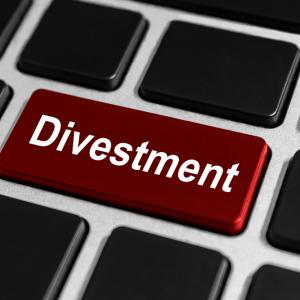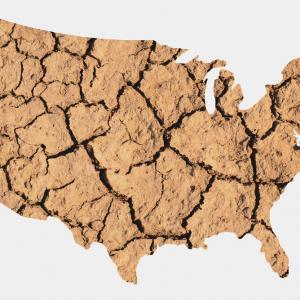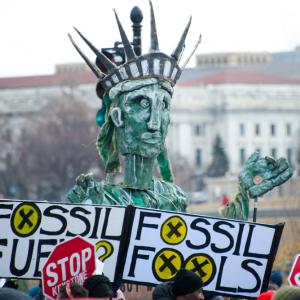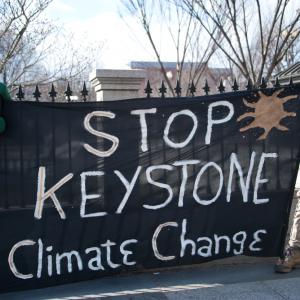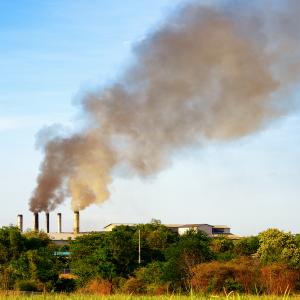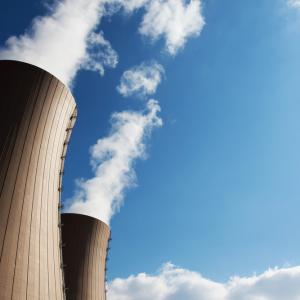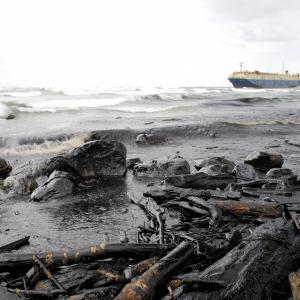
Liz Schmitt is formerly Creation Care Campaign Associate for Sojourners. A graduate of Muhlenberg College and American University, Liz has a B.A. in Environmental Studies and a Master of Public Policy. She has been a passionate advocate for creation care for several years now, in her career in environmental policy and as the Creation Care leader at her church on Capitol Hill.
Liz is from Upstate New York, where it’s impossible not to fall in love with nature. She grew up hiking, hunting and fishing, and came to Washington to combine her love for God’s creation with her love for politics. In her down time, you can find Liz around town, running or walking with foster rescue dogs, cheering with blind hope for the New York Mets, and attempting to grow something edible in her community garden plot.
You can follow her @UCSLiz.
Posts By This Author
Pruitt for EPA: Like Putting a Fox in Charge of Our Own Henhouse

Image via Gage Skidmore/Flickr
I work for a science-based organization, and we are not alone in our opposition to Scott Pruitt as the potential new head of the Environmental Protection Agency. Joining us are labor and environmental groups, faith organizations, public interest groups, former state Environmental Protection Agency heads, and even the Humane Society.
Look, if the Humane Society has a beef with the potential next head of the EPA, maybe we should all worry a little.
Nine Ways Jesus Is Like the Doctor

Image via Rooners Toy Photography/Flickr
No matter how charismatic, merciful (usually), or full of truly ancient wisdom the Doctor may be, he ultimately knows himself as less than God. It’s not likely that the Doctor believes in God, and he has particularly bad associations with Christmas, and he recognizes that he isn’t the Lord — he’s just a Time Lord. He forces Amy to face the fact that he cannot save her — that he is just a madman with a box, nothing more.
Open Letter to Christian Investment Companies: Give Members the Option to Opt Out of Fossil Fuels
By now, you may have heard that Jim Wallis and Sojourners have stopped funding climate change by divesting from fossil fuels. Unfortunately, for millions of Christians who invest at faith-based financial institutions, fossil-free investing just isn’t an option.
We’ve done our research. Of the 13 major Christian investment companies we studied, not a single one offers a way for their members to opt out of fossil fuels. We think Christian investment companies should be the FIRST to stop funding climate change! Read our open letter and sign below.
State of the Climate: How Far We’ve Come
Last night I watched the State of the Union, because I live in D.C., and this is our Super Bowl. My roommate, who works on women’s rights, was listening for any mention of her "issues." And I’m no different: I tuned in to the president’s address to hear what he would have to say about climate change.
And he did have a lot to say! This is what he said:
"And no challenge — no challenge — poses a greater threat to future generations than climate change.
"2014 was the planet’s warmest year on record. Now, one year doesn’t make a trend, but this does — 14 of the 15 warmest years on record have all fallen in the first 15 years of this century.
"I’ve heard some folks try to dodge the evidence by saying they’re not scientists; that we don’t have enough information to act. Well, I’m not a scientist, either. But you know what — I know a lot of really good scientists at NASA, and NOAA, and at our major universities. The best scientists in the world are all telling us that our activities are changing the climate, and if we do not act forcefully, we’ll continue to see rising oceans, longer, hotter heat waves, dangerous droughts and floods, and massive disruptions that can trigger greater migration, conflict, and hunger around the globe. The Pentagon says that climate change poses immediate risks to our national security. We should act like it."
What struck me was that it’s now totally normal for the President of the United States to speak firmly and at length about the clear and present danger of climate change.
Look at how far we’ve come! This is real progress — this is a cultural shift. This is a victory.
But this Monday, I marked Martin Luther King Day by reading the Letter from a Birmingham Jail with members of a neighborhood church. And I heard Dr. King admonishing me for my celebration.
White House Says President Will Veto Next Keystone XL Bill
In November, when the Senate just barely failed to pass a bill approving TransCanada’s controversial Keystone XL tar sands pipeline, Sen. Mitch McConnell (R-Ky.) interrupted the debate that followed it to tell everyone that we hadn’t seen the last of Keystone XL. He vowed that a new bill authorizing the pipeline would be the first thing on President Obama’s desk in the next session of Congress.
Sen. McConnell is making good on that promise – with another upcoming vote, he says he has the 60 votes he’ll need to pass the pipeline, which the GOP has branded as a “jobs creation” bill with dubious claims about job numbers.
But White House Press Secretary Josh Earnest announced today that “If this bill passes this Congress the president, wouldn't sign it.” This promise of a veto may have less to do with the environmental implications of the pipeline, the violation of a treaty with American Indians, or the years of steady protest from vocal opponents, and more to do with giving the State Department time to finish their review process. Regardless, it’s another stalled start for the would-be Keystone XL pipeline.
The White House needs to hear from Christians who oppose the Keystone XL pipeline. Click here to send a tweet to President Obama!
Keystone XL Fails in the Senate: What's Next?
Last night, the Senate voted on the Keystone XL pipeline — and with only 59 votes, the bill failed. (In the current political climate, it takes 60 votes to make a bill filibuster-proof so that it actually passes.)
Right after the announcement, things got loud on the Senate floor. Someone from the gallery broke out into song. Although the C-SPAN cameras didn’t show them, someone was singing loudly in the Dakota/Lakota language from the gallery up above. That someone was Greg Grey Cloud, a member of the Dakota/Lakota Nation from the Rosebud Sioux reservation.
See, in some ways, the Keystone pipeline is a symbol. If President Obama lets the pipeline pass, it shows us that he isn’t actually the president who cares the most about climate change — even if he makes major agreements on climate change pollution with China or releases the Clean Power Plan for the EPA. If he lets the Keystone XL tar sands pipe be built, he’ll be undoing so much good work, cancelling it out with a fuel even dirtier than oil.
Senate to Vote on Keystone Pipeline Tonight
Tonight at 6:00, the Senate is holding a vote on the Keystone XL pipeline. I’ve been so excited lately by all the good thing happening in Congress, but this just might spoil my mood.
Here’s what has happened lately: President Obama met with Chinese President Xi Jinping, and the two of them agreed on a climate pollution-curbing deal. It’s a move that many people never thought possible, and it means big things for international climate talks. Also big news in that arena is Obama’s recent commitment of $3 billion to the Green Climate Fund, making us one of very few prosperous nations willing to help the world’s poor and vulnerable countries grapple with the climate impacts they are already facing – stronger storms, droughts that ravage subsistence farmers, rising sea levels that displace island nations. When the U.S. delegates show up at the U.N. climate talks in Lima two weeks from now, people might actually be happy to see us!
This week is an exciting one on the national level too. This afternoon at the EPA, a group of faith representatives will hand over our thousands of comments from people of faith who support the Clean Power Plan (and want to see the rule implemented well in every state).
But just when things were looking up, enter Congress. Here’s the basic scene:
Congress Voting on Keystone XL Pipeline Today
Today the House of Representatives is set to vote, yet again, on the Keystone XL Tar Sands Pipeline. This pipeline would move bitumen, a tar-like version of oil, from the Alberta tar sands in Canada down to the oil refineries and export areas in Texas. The pipeline is controversial because of the high carbon content of tar sands oil, the sensitive farmland, aquifer, and Native American land it passes through, and the risk of pipeline spills.
The Senate will vote on the Keystone pipeline – which would require President Obama’s signature since it crosses an international border with Canada – on Tuesday, but if it passes the House and the Senate, Obama will be faced with a choice: veto or sign. He has been silent on his final decision, stalling as the State Department goes through the review process (which raised conflict of interest concerns, as a contractor working for the pipeline company also wrote State Department’s Environmental Impact Statement).
You can call your Member of Congress to let them know where you stand on Keystone XL – find their phone number here: http://www.house.gov/representatives/find/
Disinvest/Reinvest: From Fossil Fuels to Hope
Editor’s Note : This is the first post in a new series about fossil fuel divestment and clean energy reinvestment. We’ll look at how and why people of faith might choose to divest from fossil fuels as a response to climate change.
When you really care about something, it’s important not to give up hope.
If one of the things you care about is climate change and the harm we are doing to God’s beautiful world, it’s pretty hard to keep the hope alive.
After all, the world’s leading peer-reviewed scientific authority on climate change, the Intergovernmental Panel on Climate Change, just released its most damning report ever, declaring that climate disruption is at this point “irreversible.”
And then let’s look at Congress. The United States has emitted more greenhouse gases than any other country in the world, and yet it’s been five years since Congress came anywhere near passing a major climate law. (And they failed to pass that Cap & Trade law). After the most recent election last week, Sen. James Inhofe (R-OK) — who once called global warming “the greatest hoax ever perpetrated on the American people” — is set to become the gatekeeper for all climate legislation.
This should come as no surprise. Fossil fuels – the main driver of our nation’s climate culpability – are a big business. We blow up mountains to get more coal, set up dangerous oilrigs in the Gulf of Mexico, pipe tar through the breadbasket of America, and use California’s limited water supply to hydrofrack for gas. When I say “we,” I mean the fossil fuel industry. The industry spends tons of money each year propping up climate deniers, spreading misinformation, and sowing seeds of doubt about what we are doing to God’s earth. They also fund political candidates on both sides of the aisle, buying silence from elected officials whose constituents are suffering from air and water pollution, historic drought, or stronger hurricanes.
In the face of all this, I have hope — for two reasons.
Climate Change Is Happening: 4 Things You Can Do About It
The reality of climate change can be tough information to absorb, and if you’ve known for a while, it can just plain get you down. Yes, rising carbon pollution is leading to global warming. The impacts are already happening now, especially in poor countries and on our coasts. So now what? In the face of a problem on a global scale, what are we to do? Here are four suggestions.
1. Pray.
The massive scale of global warming is a reminder that we are only human. It’s overwhelming to think about and difficult to know where to start. The good news is, God is waiting for us to hand over all our burdens. This is God’s world, not ours – a perspective that can inform not only our outrage over what humans have done to the creation, but also our response. We can be the hands and feet of Christ, doing the work God calls us to do, but we are not the saviors of the world. Knowing that can be both humbling and strengthening. Prayer is a great place to start if you’re trying to figure out what to do about climate change, and it’s an equally important place to return to if you’ve been fighting the good fight for years (exhaustion and burnout are a real thing in this line of work!).
Millennials and the Myth of a Post-Racial Generation
A study came out recently saying that millennials (a category that I apparently fit into) consider ourselves the “post-racial” generation. By and large, young adults think they are the ones who have moved past racism.
Except, that’s not true. Racism is alive and well.
Here at Sojourners I’m privileged to be a part of enlightening conversations about diversity, racism, sexism, and a whole host of other injustices. This makes it all the more frustrating when I try and continue those conversations outside the Sojourners community, and I’m met with resistance. Most of my friends are extremely uncomfortable discussing race. And not just because it’s a taboo subject; this is D.C., after all, and politics are always fair game in friendly discussion. Instead, I’ve found that my friends are so unsettled by the subject that they either try and change it, or they tell me it’s not about race, it’s about income inequality. Those arguments, which I follow up with “where do you think the income inequality came from?,” are still met with resistance, and arguments that if we could just bring people out of poverty, the racial disparities would vanish.
Except they wouldn’t.
Testimony: The Word Demands the Renewal of Creation
This week began in song and prayer outside the Environmental Protection Agency.
The government employees walking past our prayer circle definitely thought we were unusual; for Sojourners, though, publicly witnessing to our calling as Christians in care for creation is just another day on the job. We gathered with interfaith partners for a morning blessing to kick off the EPA’s hearings on the Clean Power Plan – an ambitious plan to curb carbon emissions from our largest source, power plants. Our goal was to show EPA and the nation that people of faith care deeply about what human sin has done to creation, and how all of God’s creation – including people – are suffering and will continue to suffer from climate change.
The next day, I was back at the EPA, this time to offer my testimony during their second day of hearings.
University of Dayton, a Catholic University, Moves to Divest from Fossil Fuels
Another Christian school moves to divest – this time, a Catholic university
Just one week after Serene Jones, President of Union Theological Seminary, announced their decision to become the world’s first seminary to divest from fossil fuels, another first announced. The University of Dayton, a Catholic, Marianist university, will divest fossil fuels from its $670 million investment pool. This is the first Catholic university in the world to do so.
Just as divestment makes sense for Union Theological Seminary and its history of engaging social justice, this choice is in line with Catholic social teachings and the Marianist values of leadership and service to humanity. Marianists view Mary, the mother of Jesus, as their model of discipleship, and their mission is to bring Christ into the world and work for the coming of Christ’s kingdom.
Union and the University of Dayton are the newest schools joining the growing list of U.S. colleges and universities divesting from fossil fuels as a way to stop financially supporting the climate pollution and the public health implications of coal, oil, and natural gas as the dominant sources of energy in the country. Their announcements are unique because they speak not only of the moral choice, but of the Christian choice on matters of financial investment.
At the Presbyterian Church (USA) General Assembly this past week, in addition to the denomination’s decision to divest from three companies in relation to conflict in Israel/Palestine, a decision was made to begin the discernment process on fossil fuel divestment. The fossil fuel divestment conversation is happening in many churches and religious institutions across the country, and Union Theological Seminary and the University of Dayton are clear that they see this as an act of Christian witness for protecting God’s creation and people.
Information is from The University of Dayton’s website.
Why Union’s Decision to Divest from Fossil Fuels Matters
Last week, Serene Jones, president of Union Theological Seminary, announced that the school is divesting its endowment of fossil fuels. It is the first seminary in the world to do so, marking Union’s latest action in a long legacy of social justice commitments.
So what? Well, it helps to look at this news in context.
Christians Affirm the EPA’s New Clean Power Plan
"The Clean Power Plan is a great step forward for our country in taking climate change seriously. It’s clear that President Obama cares about the legacy he leaves to today and into future generations. While there is a lot more that can and should be done by this Administration and by Congress, President Obama deserves our appreciation for embracing the common good and taking such a big step to preserve the earth for our grandchildren’s grandchildren."
EPA Unveils Clean Power Plan to Cut Carbon Pollution
The U.S. Environmental Protection Agency just released its new plan to cut carbon pollution from power plants, the first policy of its kind. This plan will cut carbon dioxide pollution from existing fossil fuel power plants 30 percent below 2005 levels by the year 2030. EPA could have chosen a better benchmark, since we’re already 13 percent below our 2005 pollution levels because of the recession and natural gas. But this plan still carries many benefits: it allows the states flexibility in meeting the 2030 goal, and the reduction in smog is projected to prevent 2,700 to 6,600 premature deaths and 140,000 asthma attacks in children. It also shows the U.S. is finally taking leadership on global warming, which is likely to have an impact on the world stage.
EPA Administrator Gina McCarthy is speaking in a press conference at 10:30 am Eastern Time about details of the new rule; C-SPAN is streaming it live online.
You can find the full rule as well as summaries and analyses here.
To join Sojourners in responding to the rule via public comment, join us HERE.
We Can't Afford Dirty Energy: Thoughts on Turkey, Appalachia, and Humility
Two weeks ago in Soma, Turkey, a coal mine explosion left 301 people dead. It was the country’s worst mining disaster, but it wasn’t the first — and it wasn’t the last, as multiple fatal accidents have happened in the two weeks since. The last time a mining disaster caught the world’s attention, we watched and waited and prayed during the rescue operation for the miners in Chile.
In Turkey, people protested in the streets of Soma — protested against Soma Mining for letting this happen, against their government for loopholes in safety rules. In response, the police issued a ban on protests and locked the city down. The ruling political party proudly announces that it has inspected that mine 11 times in the past 5 years; Soma Mining denies negligence. And the families of 301 persons mourn their losses.
This isn’t a faraway problem. In the United States, we don’t do as much traditional mining as we used to — instead, we do mountaintop removal. This has a human cost, too, in more insidious ways. The people living in Appalachia have higher rates of respiratory illness, cancer, kidney diseases, skin ailments, and more. And the landscape, which has the fingerprints of God in it, is being blown apart.
Psalm 95:4-5 says:
“In [God’s] hand are the depths of the earth; the heights of the mountains are [God’s] also. The sea is [God’s], for [God] made it, and the dry land, which [God’s] hands have formed.”
Our Biggest Climate Change Policy Ever Looms
June 2 is going to be a big deal.
Why? Because EPA Administrator Gina McCarthy is about to unveil our biggest climate change policy ever.
It didn’t go through Congress because Congress continues to fail us on our most urgent threat to the planet — even though the majority of Americans in every state agree that climate change is happening and we are the main cause and despite the recent news from the National Climate Assessment that climate change is happening now, and the effects are visible in every single state.
Instead, the Obama Administration is acting on climate change through the Environmental Protection Agency (EPA). The President’s Climate Action Plan has a number of policies within it, including energy efficiency for congregations, and this latest rule will limit carbon pollution from our existing power plants.
Reject and Protect
Editor's Note: Want more ideas for how to celebrate Earth Week? Click here to sign up for Earth Week updates through Friday.
This week, we finally had some good news in the fight against climate change: President Barack Obama announced a further delay in the review process for the Keystone XL pipeline. The right thing to do is to reject the pipeline once and for all, but we all know politics is never that simple. The president says no decision will be made until the end of the year, which means the deadline comes after this year’s election. But the president isn’t up for re-election again, and protecting the environment should not be a partisan issue. All of us have a stake here.
We need more time, President Obama says, more reviews, more answers. But for Sojourners’ Rose Berger, who has been a leader in the faith community’s witness against Keystone XL, the answer has been clear for a long time.
Oil-Covered Birds, Andrew Bird, and a Chance for Redemption
Andrew Bird is one of my favorite musicians. I love the way he makes a one-man band, looping over his own violin playing, singing, whistling, and stomping to create beautiful songs. No two live performances are the same. And once, when I saw him in D.C., he played a new song that was still being written — one that had come from his heart, but he hadn’t yet finished and didn’t think it had an end.
He told us he wrote the song during the BP oil spill, often called “Deepwater Horizon,” that happened in the Gulf of Mexico. During that disaster, over 200 million gallons of crude oil spewed into the Gulf for days on end from a hole nobody could plug, and the whole country watched it happening live.
